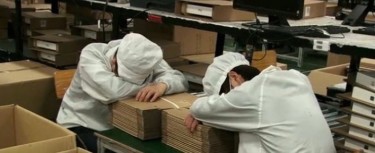The Problem of Sleep

“The major determinant of short sleep is actually work,” said Mathias Basner, a professor at the University of Pennsylvania’s medical school, who has studied short sleepers. “People who work a lot of hours, they are much more prone to be short sleepers.” Other activities that appear to be disproportionately displacing the time of short sleepers: commuting, television watching at night and personal grooming in the morning, according to Mr. Basner’s work. If you’re trying to sleep more without cutting back on work hours, Mr. Basner recommends avoiding TV before bed, spending less time getting ready for work and living closer to your workplace.
This a misstatement of the actual problem, which is that these people need to sleep at all. If they did not need to sleep — if they could just work, without stopping — they would not need to worry about wasting time watching television; getting ready to go to work; or being able to afford to live closer to work to cut down on the commute. Fortunately, our marvelous innovation economy is perfectly suited to solving this, the real problem — human weakness.
